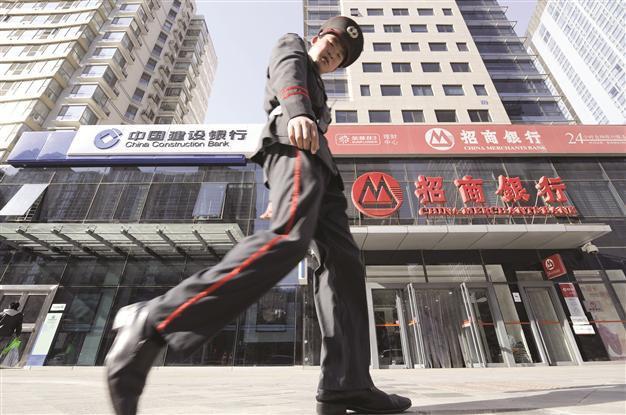China to end lending monopoly
BEIJING - Agence France-Presse

A security worker walks in front of bank outlets along a street in Beijing yesterday. The Chinese government wants to break up of a banking ‘monopoly’ on lending that has squeezed private businesses. AFP photo
China’s Premier
Wen Jiabao has called for the break-up of a banking “
monopoly” on lending that has squeezed private businesses as the global economy slows, state media reported.
Wen said the banks’ stranglehold on lending needed to be broken to ease the flow of private capital in
the world’s second-largest economy, in comments published on the China National Radio website early yesterday.
“In regards to financing costs, let me honestly say that our banks are making a profit too easily. Why is this so? It’s because a few big banks are in a monopoly position,” he said.
“Only when we approach these banks can we successfully get loans, if we go to other places it is very difficult.
“What we can now do to ease private capital flow into the financial system, fundamentally speaking, is to break this monopoly.”
China has seen an explosion in underground lending fuelled by credit restrictions, raising concerns among top leaders about a surge in bad debts and defaults in the private sector.
Independent business owners have had to borrow money at high interest rates from informal lenders after being rejected by major banks, who favour other state-controlled enterprises because their debts are implicitly guaranteed by the government.
“They’ve got worries about growth and the private firms don’t have any cash, so they’ve got one tap and that seems to be the big Chinese banks,” said Justin Harper, an analyst with IG Markets in Singapore.
China’s major banks have reported strong profits despite the slowing economy, further fuelling resentment as companies struggle to access much-needed credit.
Bank of China said last week its 2011 net profit rose 18.93 percent, while the Industrial and Commercial Bank of China, the country’s biggest lender, reported net profits up 26 percent last year.
Wen, who is due to step down in 2013 after 10 years as prime minister, was speaking during a tour of two southern provinces -Fujian and Guangxi- both strongholds of China’s vast manufacturing industry.
Promoting private firmsThe premier also said an experimental reforms recently introduced in the eastern city of Wenzhou to help struggling private firms could be expanded nationwide.
Those reforms included encouraging state-owned banks to lend more to small firms and allowing private companies to issue corporate bonds to raise funds.
Wenzhou, which has 400,000 private companies, has earned a reputation as the centre of China’s private economy.
It was hit by a debt crisis last year when more than 90 bosses of private companies fled after being unable to repay crippling debts as the economy slowed.
The crisis cast a spotlight on underground lending that had flourished in the city as authorities clamped down on official financing channels and major banks chose to lend mainly to large state-owned enterprises.
In February, China’s central bank cut commercial banks’ reserve requirement ratio -the funds banks must place in reserve- by 0.5 percentage points to ease restrictions on lending.
